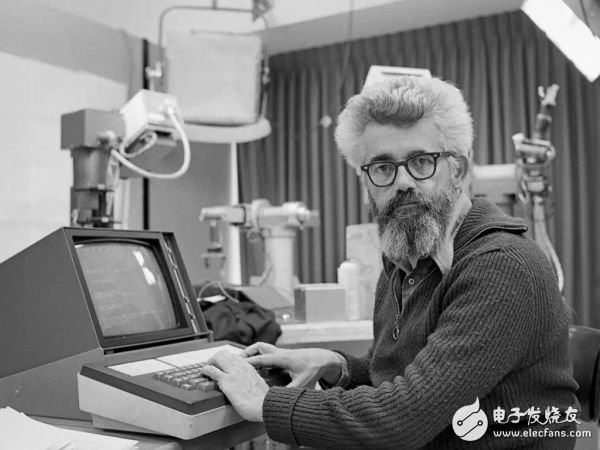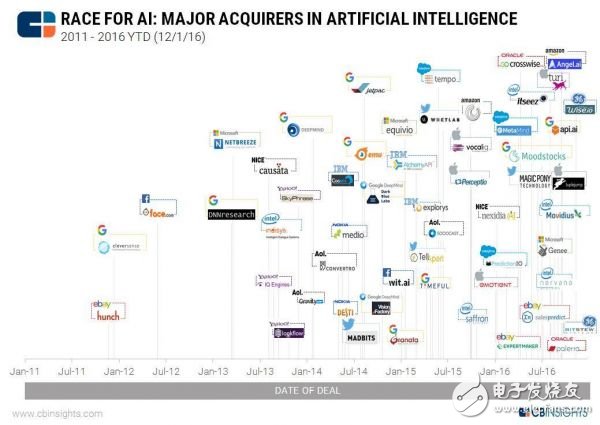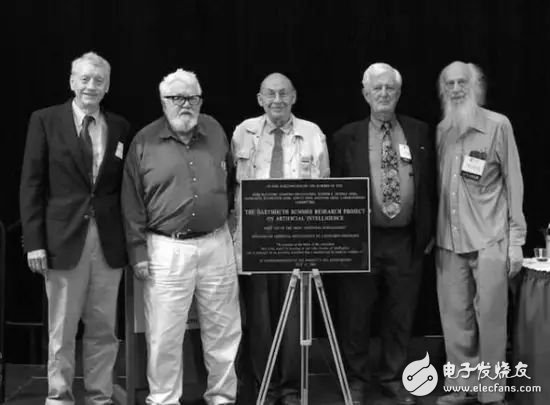Artificial intelligence gradually entered our realization as time passed, from which he experienced sixty years, and in the long period of sixty years, how many prejudice and misjudgment he experienced. What role he will play in the future, and what kind of thoughts and dangers he will bring to us.
In the past two years, artificial intelligence and deep learning have become entrepreneurial scholarships. In order to recruit engineers, some of the research labs in Silicon Valley have a high salary and are staggering. The planning of a country is as small as a business plan, without artificial intelligence, and it is difficult to move.
In fact, since the birth of the term "artificial intelligence" in 1956, the artificial intelligence research and development has been hot. The reason is that everyone, including scientists, has prejudice and misjudgment of artificial intelligence.
This time, can humanity abandon prejudice and have fewer misjudgments?
1. Where does AI come from?Eliminate prejudice, starting with the vocabulary of artificial intelligence.
Who created the word artificial intelligence?
To answer this question, you can't get away with the 1956 Summer Research ProjecTIon ArTIficial Intelligence.
At that time, this was a very ingenious meeting name. The name of the meeting was John McCarthy, then an assistant professor of mathematics at Dartmouth College.

In the summer of 1955, McCarthy went to work for a research team at IBM. The head of the team was Nathaniel Rochester, the chief designer of IBM's first-generation general-purpose machine 701, and interested in neural networks. Upon seeing each other, they decided to do an event at Dartmouth University in the summer of the following year, so they wrote a project proposal for the Rockefeller Foundation, hoping to get funding.
The budget for McCarthy's application was $13,500, but the Rockefeller Foundation only approved $7,500. McCarthy is expected to have six academic representatives present, and eventually 10 people participated, one of them studying checkers and one studying chess.
The original plan was a two-month closed-door seminar, but only Solomonov took a serious summer vacation.
The common misconception is that the term "artificial intelligence" was coined by McCarthy, but it is not. McCarthy recalled in his later years that the word "artificial intelligence" was first heard from others, but he could not remember who it was.
British mathematician Woodward wrote to New Scientist magazine that he was the creator of the term artificial intelligence, and McCarthy listened to him because Woodward went to MIT in 1956 to communicate. I have seen McCarthy. However, McCarthy's proposal began using "artificial intelligence" in 1955.
Since many scientific representatives in that era have passed away, who created the term artificial intelligence has become a public case.
2. How hot is AI?"I am so young, of course I hope I have been winning, I have been proud, how many years have I ruled the board?" In March 2016, South Korea's Go player Li Shishi played against Google's artificial intelligence Go software AlphaGo before the Chinese Go player Ke Jie just beat him in an open final.
A month later, the Alpha dog won Li Shishi; one year later, the Alpha dog won Ke Jie.
In fact, Google has a lot of dogs: self-driving dogs (has traveled more than 2 million kilometers), medical dogs (DeepMind has been tested for disease diagnosis), translation dogs (automatic translation of Google's dozens of languages), military dogs (Boston Dynamic robots) ), financial dog? ?
In the words of Sundar Pinchar, Google’s chief executive, artificial intelligence has made it possible for things that were unimaginable a few years ago.
This endless enthusiasm and expectation for artificial intelligence has almost swept the world.
In the United States, companies such as Google, Apple and International Business Machines (IBM) have already launched their own artificial intelligence programs. At the Developers Conference, Google announced the "Artificial Intelligence First" strategy; at the Aspen Ideas Conference, Microsoft President Satya Nadella called on humans to collaborate with artificial intelligence systems to enhance humans with designed machines. Even if Musk re-emphasizes the threat of artificial intelligence, both Tesla and Space X rockets cannot be separated from artificial intelligence. Especially Tesla's automatic driving technology, the core is artificial intelligence.
With goals and pursuits, there must be talent.
In recent years, top professors have left the academic world, and examples of entering the technology industry abound. University of Toronto's Geoffrey Hinton joined Google, New York University Yann LeCun went to Facebook, and Stanford University Andrew Ng joined Baidu, Carnegie Mellon University Alex Smola went to the Amazon.
Those who have just got a diploma have also become popular.
"Artificial intelligence graduates are worth between $5 million and $10 million, which is the bottom line for technology companies," said Andrew Moore, dean of the School of Computer Science at Carnegie Mellon University (CMU).
In addition to "plundering" talent, large companies are also vigorously "harvesting" start-up projects.
According to the CB Insights report, M&A activity in the artificial intelligence industry has increased sevenfold since 2011. Most startups will be acquired in the first four years of the first round of financing, and nearly 140 artificial intelligence startups have been acquired. In the third quarter of 2016 alone, the acquisition amount reached $1.05 billion.
In order to get the best artificial intelligence solution, technology giants such as Google, Apple, IBM, Yahoo, and Intel have been increasing their efforts to acquire artificial intelligence startups. Microsoft has invested in artificial intelligence for about 25 years, specializing in "investing in artificial intelligence startups that are growing fast and have a strong impact on society."

According to The InformaTIon, the most recent acquisition of artificial intelligence companies in the past two years was Google, which bought 9 wholly-owned companies. Apple bought 5, and Intel and Twitter bought 4 respectively.
In China, according to incomplete statistics from a number of institutions such as China, in 2016, China has publicly disclosed more than 200 investments in the AI ​​sector, with a cumulative investment of more than 20 billion yuan. The industry believes that in the next two years, the amount of investment in the AI ​​field will maintain rapid growth, and the total amount of investment in 2017 may be three times or even higher in 2016.
What kind of scene is the consumer side?
CCTV's "First Lessons of the School" column allowed the Italian robot TEO to "snap" the piano with two young pianists.
Ke Jie, who had just been defeated by the Alpha dog, participated in a scientific challenge class called "Tactic People" and confessed to the artificial intelligence robot "Girl Poet" Xiao Bing!
3, AI detourTaking history as a guide, you can know that it is a replacement.
This wave of artificial intelligence seems to have met.
One detail is that artificial intelligence, widely recognized as a vocabulary, stems from a philosopher's suspicion that it was ten years after the Dartmouth conference.
In 1965, the European philosopher Hubert Dreyfus of the University of California at Berkeley published "Alchemy and Artificial Intelligence," and talked about the work of Newell and Simahe.
A few years later, based on this article, Dreyfus expanded the content into a book—“What can't the computer do?†and artificial intelligence became the target.
Why can a question cause such a big sensation? Because the researchers in the direction of artificial intelligence in those years have misjudged the situation.
Newell and Herbert Simon were two heavyweight participants who participated in Dartmouth that year.
Because of the marginal meeting, Newell and Sima He cooperated in research for a lifetime. In 1975, they shared the Turing Award, and three years later Sima He won the Nobel Prize in Economics.
Perhaps because of academic self-confidence, in 1957, Sima He predicted that the computer defeated the professional chess player within ten years.
In 1968, McCarthy and chess master David Levy bet that the chess process would beat Levi in ​​ten years. Levi lost $2,000 for this.
It was in this "entertainment" atmosphere that Dreyfus found the point of attack.
This is a tidbit in the development of artificial intelligence. It has witnessed the rise and collapse of the first bubble of artificial intelligence from the side. From 1956 to 1974, logic provers, perceptrons, and reinforcement learning can only be done very simply. A task with a very narrow face, the computer at the time, whether it is memory or processing speed, is not enough to solve any practical artificial intelligence problems.
After about 10 years of silence, artificial intelligence ushered in the second wave of enthusiasm in the 1980s. A kind of artificial intelligence called "expert system" is popular, and "knowledge processing" has become the focus of research and development. However, the practicality of the “expert system†is limited to certain specific scenarios and cannot be popularized. The second bubble burst.
Sima He’s prophecy in 1957 was not realized until 1997. In 1997, IBM’s “dark blue†defeated Kasparov.
Forty years, I have become a wish. To this end, Sima He and Japanese computer scientist Munakata co-authored "AI Lessons".
With the victory of the deep blue, artificial intelligence ushered in the third wave of enthusiasm, the victory of the Alpha dog, adding a fire to this wave, deep learning and artificial intelligence became dominant.
The comprehensive interpretation of the development of artificial intelligence industry in China and the United States recently launched by Tencent Research Institute pointed out that since the emergence of the first artificial intelligence venture investment in the United States in 1999, global AI has accelerated development, and within 18 years, it has invested in venture capital in the field of artificial intelligence. A total of 191.4 billion yuan.
Start-up master and Steve Blank, an adjunct professor at Stanford University, said that in the future, everything will have artificial intelligence.
This time, will the bubble burst?
Pierrot Sgaroufi, Dean of the Silicon Valley Artificial Intelligence Institute in the United States, "has been in Silicon Valley for more than 30 years, focusing on a field of technology, artificial intelligence", and experienced two times of artificial intelligence.
For the third climax that is currently emerging, he maintains considerable vigilance. "There is a bubble in Silicon Valley, China has learned Silicon Valley, and the bubble is bigger."
In the market, there are “answers†​​for “will†or “noâ€. In fact, the biggest uncertainty of this problem lies in how much space technology can give to human imagination.
4. What is the use of AI?In 1955, in a project application for the Rockefeller Foundation, McCarthy listed seven areas of planned research:
Automatic computer
Programming language;
Neural Networks;
Theory of size of acalculaTIon;
Self-improvement (machine learning);
abstract;
Randomness and transcendence.
More than sixty years have passed, and the study of artificial intelligence has focused on the shaping of six capabilities:
Perception ability is mainly divided into visual and auditory. At present, the public is more familiar with computer vision (CV) and voice recognition (voice recognition);
Language Proficiency (NLP), the range extended by this ability is also quite wide. In addition to speech recognition, there are voice-to-text, text-to-speech, text semantic extraction, text sentiment analysis, text categorization, grammar analysis, etc.
Memory capacity. This ability seems easy and practically very difficult;
Reasoning ability
Planning, the pursuit of optimal decisions / routes / actions. For example, autonomous driving technology is inseparable from high-performance and high-precision planning algorithms;
Learning ability. Such as machine learning, deep learning. In particular, deep learning is the most prosperous branch of artificial intelligence in the market.
It is not difficult to see that the Alpha dog that everyone is currently advocating is just a small branch of artificial intelligence.
As one knows what users say, what is currently called "artificial intelligence" is actually a fairly extensive group of people. The problem of artificial intelligence is quite diverse, and mainstream academics generally do not call themselves " "Artificial intelligence" is generally engaged in machine learning, statistical learning, neural networks, logic programming.
From this perspective, the commercial bubble of artificial intelligence will not and cannot stop the development of this discipline.
In 2006, at the Dartmouth Conference for 50 years, only five of the ten attendees were still alive. Moore, McCarthy, Minsky, Seyfried and Solomonov reunited in Dartmouth. Recalling the past and showing the future.

One of the participants, Horvitz and his wife, paid a sum of money to donate an "AI100" event at Stanford University: in the next 100 years, each hero will meet and an AI progress report will be issued every five years.
5. How dangerous is AI?what do you do?
What we do is artificial intelligence!
Why did you start this company after the hot money came?
On March 28th, 2016, at an investment fair, Silicon Valley venture capital Greylock partner Josh Elman repeatedly emphasized that artificial intelligence is not a “business gimmick†and can solve real problems.
The University of Chicago hosted an artificial intelligence forum in Silicon Valley. Investors talked about how to evaluate an artificial intelligence startup: products can be “valued†on the first day of the product, rather than requiring other packages that are not worthy of user value; The profit model does not require a profit and loss balance but has a turnover; most importantly, each new user brings more value to the company.
In fact, in the face of today's artificial intelligence wave, investors and companies are using a business judgment standard to measure risk. However, they ignore the ethical risks.
In fact, human beings are full of prejudice in the face of ethics.
In the NISSEI ECO plan of the Japanese manufacturing company, one of the contents attracted attention, and the funeral was hosted by the humanoid robot Pepper.
In the laboratory of the American Institute of Artificial Intelligence (Facebook), two robots sometimes use non-human language for negotiating dialogue. Researchers had to adjust the model to prevent it from chatting.
Is the commercial value of the former larger than the latter?
Really not necessarily. No one can be sure that the families of the deceased can face the prayers of the robots calmly, because those voices cannot contain emotional and religious feelings.
For the question of "the role of artificial intelligence (AI) in human society in the future", the recent debates between the two giants in the US Silicon Valley are a microcosm of the above problems.
Tesla CEO Elon Musk believes that human beings will be dominated by artificial intelligence in the future. "The potential danger of artificial intelligence is not groundless, and it is indeed possible to endanger human survival in the future." He said that in the future artificial intelligence It may turn into a human master, and human beings will become sub-citizens, and may even face the rebellion of artificial intelligence.
Facebook CEO Mark Zuckerberg believes that such a pessimistic attitude is very irresponsible. "The use of artificial intelligence does not lead to situations as predicted by Musk, but is of great help to humans. Driving, for example, is still one of the main causes of human death. If you use artificial intelligence to solve this problem, it will be a major improvement."
Dick Costolo, the former chief executive of Twitter, also joined the discussion, and Zuckerberg underestimated the potential dangers of artificial intelligence.
In 1950, Alan Turing considered a question: "Can the machine think?"
67 years later, Musk began to consider a question: "How dangerous is the machine?"
In the past 67 years, humans have had enough knowledge of artificial intelligence, but prejudice is still there, because there is no standard answer to every thinking about artificial intelligence.
Rechargeable Vape Pen Kit are so convenient, portable, and small volume, you just need to take them
out of your pocket and take a puff, feel the cloud of smoke, and the fragrance of fruit surrounding you. It's so great.
We are China leading manufacturer and supplier of Disposable Vapes puff bars,rechargeable vape pen kit disposable,
rechargeable vape pen kit for beginners,rechargeable vape starter kit, and e-cigarette kit, and we specialize in disposable vapes,
e-cigarette vape pens, e-cigarette kits, etc.
rechargeable vape pen kit disposable,rechargeable vape pen kit for beginners,rechargeable vape starter kit,rechargeable vape pen kit with battery,rechargeable vape pen kit 900mah
Ningbo Autrends International Trade Co.,Ltd. , https://www.supervapebar.com